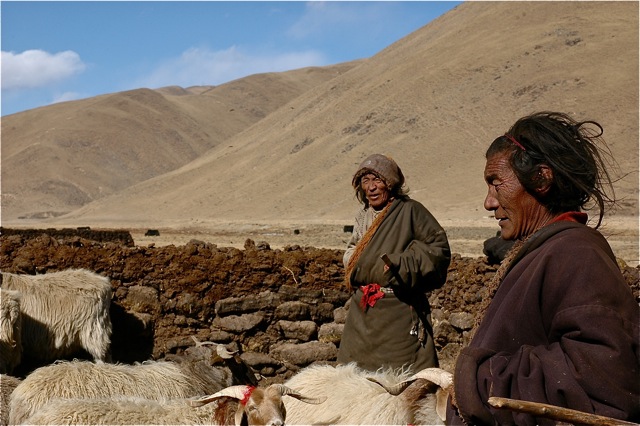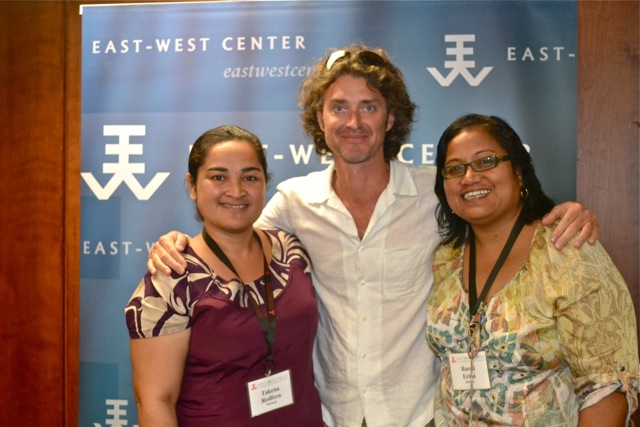So much of the time I’ve had here with the East West Center in Honolulu as an invited speaker has been time spent showing, seeing, and being reminded of the very similar plights that people share, while living in very different spaces leagues away from one another.

During one talk, I introduced portraits and words of indigenous locals (their words not mine) and their observations of Global Warming and Climate Change in their intimate worlds within the Himalayas. What followed the talk was a number of women from the incredibly gifted and committed ‘Pacific Islands Women in Leadership Program’ coming to express the feelings of empathy and a kind of kinship in the struggle to deal with an imminent threat to basic livelihoods.

I’m joined by the ‘forces of nature’ from Kiribati Takena Redfern and Roreti Eritai. Both felt enormous parallels between their world of rising ocean levels and the Himalayan worlds of nomads where ice and snow disappear at an ever-increasing speed.
It is perhaps when far off lands ‘collide’ and when stories are shared that there is an opportunity for complicity and understanding that the world – more than ever – needs engagement, and a sense of shared purpose to move forward.

About JeffFuchs
Bio
Having lived for most of the past decade in Asia, Fuchs’ work has centered on indigenous mountain cultures, oral histories with an obsessive interest in tea. His photos and stories have appeared on three continents in award-winning publications Kyoto Journal, TRVL, and Outpost Magazine, as well as The Spanish Expedition Society, The Earth, Silkroad Foundation, The China Post Newspaper, The Toronto Star, The South China Morning Post and Traveler amongst others. Various pieces of his work are part of private collections in Europe, North America and Asia and he serves as the Asian Editor at Large for Canada’s award-winning Outpost magazine.
Fuchs is the Wild China Explorer of the Year for 2011 for sustainable exploration of the Himalayan Trade Routes. He recently completed a month long expedition a previously undocumented ancient nomadic salt route at 4,000 metres becoming the first westerner to travel the Tsa’lam ‘salt road’ through Qinghai.
Fuchs has written on indigenous perspectives for UNESCO, and has having consulted for National Geographic. Fuchs is a member of the fabled Explorers Club, which supports sustainable exploration and research.
Jeff has worked with schools and universities, giving talks on both the importance of oral traditions, tea and mountain cultures. He has spoken to the prestigious Spanish Geographic Society in Madrid on culture and trade through the Himalayas and his sold out talk at the Museum of Nature in Canada focused on the enduring importance of oral narratives and the Himalayan trade routes.
His recently released book ‘The Ancient Tea Horse Road’ (Penguin-Viking Publishers) details his 8-month groundbreaking journey traveling and chronicling one of the world’s great trade routes, The Tea Horse Road. Fuchs is the first westerner to have completed the entire route stretching almost six thousand kilometers through the Himalayas a dozen cultures.
He makes his home in ‘Shangrila’, northwestern Yunnan upon the eastern extension of the Himalayan range where tea and mountains abound; and where he leads expeditions the award winning ‘Tea Horse Road Journey’ with Wild China along portions of the Ancient Tea Horse Road.
To keep fueled up for life Fuchs co-founded JalamTeas which keeps him deep in the green while high in the hills.



Very cool, and important connections being made.
Have you had the chance to meet Roger Ames? I wonder what Confucian or Daoist applications to climate change he might think were relevant or potentially useful. Wonderfully thoughtful giant in Chinese philosophy.